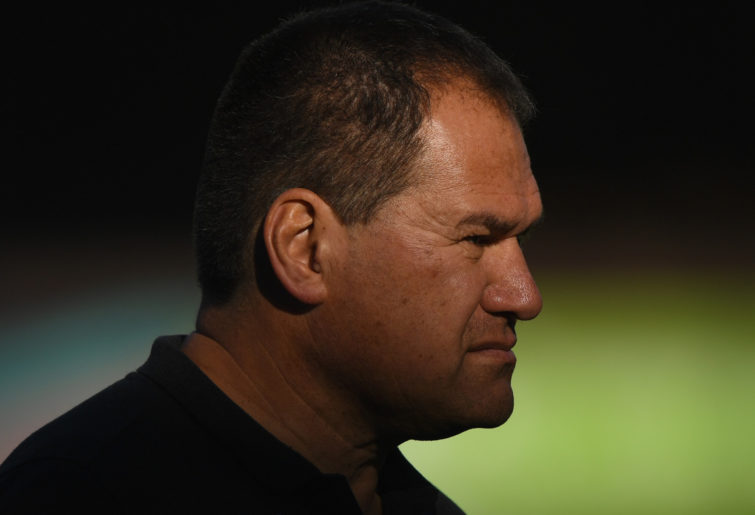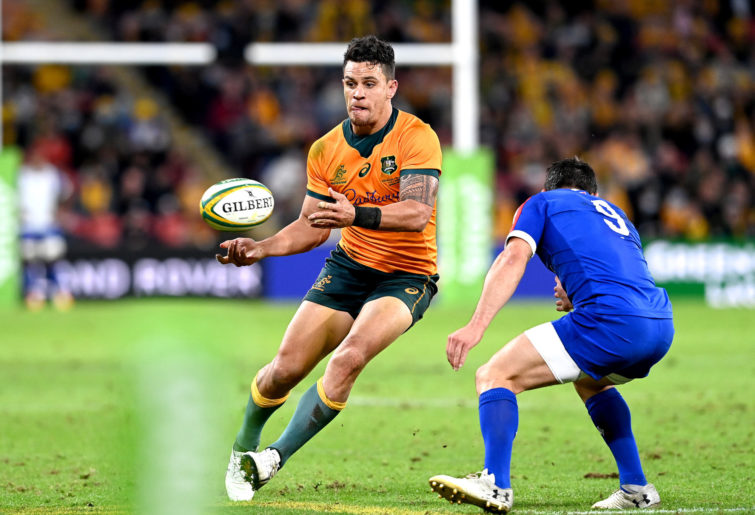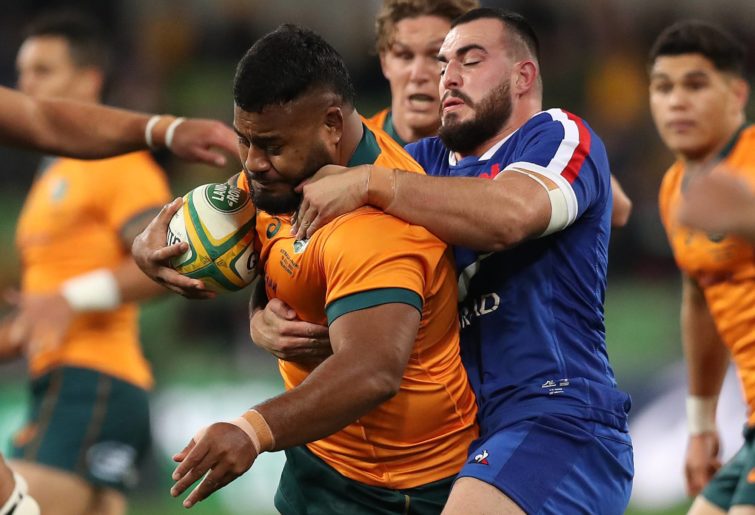If we’ve said it once, we’ve said it a million times. And that might not be as big an exaggeration as it looks.
Even just last week and again in Tuesday’s two-up panel, plenty of us in numerous discussions were highlighting the breakdown speed and accuracy as being an ongoing concern for the Wallabies.
Here’s a quick cut and paste from my offering, which in itself was pointing to the chaotic final moments of the first Test in Brisbane last week.
“The attacking cleanout needs to be the focus for the second Test. I mentioned last week that it was outstanding to see Angus Bell and Lachie Lonergan first on the scene when Tate McDermott went to ground with the fatally loose French ball last week, and with Rob Valetini, Darcy Swain, and Taniela Tupou not far behind.
“And as I mentioned, this was great to see in the 81st minute, because there had been way too many occasions in the preceding eighty minutes where the attacking clean out was either too slow, too ineffective, or too non-existent.”
And from the first post-match question after France squared the series in Melbourne on Tuesday night, Dave Rennie was already confirming where the Wallabies let themselves down. Again.
“We didn’t get off to the fast start we wanted,” he said.
Indeed, it was quite the opposite, with Les Bleus centre Jonathan Danty first on the scene to isolate Hunter Paisami in the first minute of the game. It was 3-0 after two minutes, and 13-3 20 minutes later.
Rennie continued: “We found ourselves behind, but we fought our way back in like we did last week. I thought we’d stolen it late, but not to be.”
“You’ve got to give France credit. They are really good over the ball. I think we got penalised nine times at the breakdown and obviously that had a massive effect on our continuity and our ability to hurt them.”

(Photo by Stu Forster/Getty Images)
And this is certainly the truth.
In the end, the Wallabies conceded 12 penalties for the game. Rennie’s figure of nine breakdown penalties conceded feels about right without an itemised penalty list to cross reference, and the scoreboard tells us that fullback Melvyn Jaminet kicked seven penalties from as many attempts.
The short of it: when the Wallabies conceded a penalty at the breakdown, it cost them points most of the time.
Rennie acknowledged that the Melbourne performance was better than the first Test in Brisbane, but even then found himself coming back to a familiar theme.
“We created plenty of opportunities, but it’s probably a double-edged sword,” he said.
“We got ourselves into positions where we probably should benefit, but we didn’t, and again, I think it came down to losing the race around some of the breakdown stuff, and a lack of patience.
“We’ve got to be prepared to go through the middle and squeeze them up, to earn the right to go wide.
“But we found a bit of space down the sidelines early in the game, and maybe they lulled us into playing a bit wide too early at times. We’ve learned a lesson from that, and hopefully we see a better effort on Saturday.”
It was a double-edged sword, but for different reasons, I’d argue.
It was a double-edged sword, because the Wallabies were getting towelled up on the floor and pinged in the middle of the field, so decided to go too wide too early, which then in turn led to blokes getting isolated and pinged out there, too.

(Photo by Bradley Kanaris/Getty Images)
So this has to be the obvious focus for the third Test in Brisbane – not that they’ll have a lot of training time in between matches – but the Wallabies actually need to use the French as a benchmark for the rest of their season and beyond.
Interestingly, neither Rennie nor Michael Hooper had any refereeing gripes to air on Tuesday night.
“I thought he was pretty clear. From the ARs and the man in the middle, I think they communicated well to us what was going on,” Hooper said.
“Look, the French were good over the ball and they beat us. They were more urgent than us to the breakdown. You’ve got to commend them on that.
“A lot of the turnover came from us actually getting the nose through and getting a little semi-line break, and the French were sharp onto that isolated man there.
“From our side of things, a bit of urgency once we do make that initial half break there, and we would have seen a different story. It’s a mindset thing and an important price that we put on that sort of thing that we need to get right.”
It’s a mindset thing.

(Photo by Daniel Pockett/Getty Images)
Both Hooper and Rennie spoke of “urgency to breakdown” being a crucial lesson for Saturday’s decider, with Rennie even suggesting that he “wants to see a reaction” from the inevitable changes he’ll have to make.
“They’ll be fresh and full of beans, and give us some key energy,” he said.
We should see what those changes are later this morning.
The mindset thing is interesting, because as much as fitness drives a player around the field, it’s their mindset and attitude that pushes them into the dark places.
Just yesterday The Roar‘s own Will Genia spoke of the biggest difference and challenge between Super Rugby and Test matches: “You have less time and space, and you have less room for error.”
I’ve referred several times in recent weeks to a chat I had with Laurie Fisher after the Brumbies returned from New Zealand, where they found out the hard way that being even half a metre behind in the race the breakdown can be the difference between holding onto the ball and watching it disappear behind you.
But the adjustments are quite achievable, Fisher told me: “A metre here, two metres there. Tighten up that bit. That’s how you make great gains, and you can be competitive all of a sudden.”
Being a metre or even just half a metre closer to the tackled teammate in possession is the difference between the arriving opposition defender having a clean shot at the ball, or having to clean out and possibly compete.

(Getty Images)
This was the harsh lesson the Wallabies were dealt on Tuesday night, but it was at least heartening to hear Hooper not speaking in terms of training track form, as he often did in years gone by, but in genuine ‘this is how we do it’ terms that you’d expect from a leader.
“Yes, it sucks losing. Our change room is deathly quiet at the moment. But, the only negative will be if we take nothing from this, if we don’t take a lesson learned.
“How we can get that scrum, deliver that scrum at the end, and then backdating all the stuff that happened beforehand to try and put us in a better situation.
“We got a lot of learnings out of that. That will be the negative, if we don’t take them.”
The negative is the use of “learnings”, but the point certainly stands. And it was notable that Rennie sat there, listening intently.
The current international breakdown yardstick is wearing a Bleus jersey, and the Wallabies have to learn from this.
And quickly.
Original source: https://www.theroar.com.au/2021/07/15/french-breakdown-precision-must-be-the-wallabies-goal-in-2021/
https://therugbystore.com.au/french-breakdown-precision-must-be-the-wallabies-goal-in-2021/
No comments:
Post a Comment